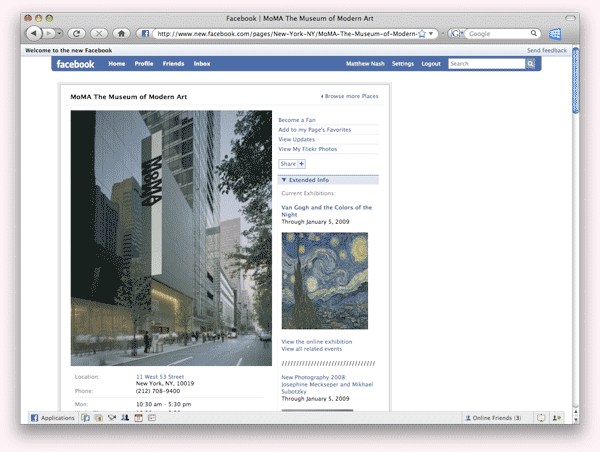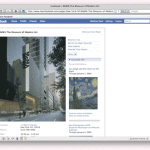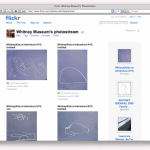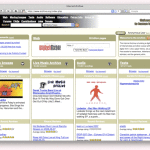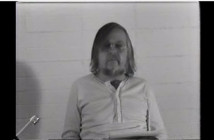A REPORT FROM THE PHANTOM ZONE
"History is more or less bunk."
– Henry Ford
I lost my portable hard drive the other day.
The strange thing is, it really didn’t matter. Even a few years ago, if my hard drive had crashed, my world would have crashed with it. I used to store all of my pictures and important documents on hard drives that I was in possession of, but now, all of my important pictures have been uploaded either to Flickr or to an on-line printing service where they are stored. At some point, I had e-mailed most of my important documents to myself or I had FTP’d them up to my server. So nothing was lost.
Somehow, slowly, the story of my life is no longer stored with me. I’ve heard legends of people running into houses that were on fire to save family albums of photographs and safes of documents. I think if my house was on fire, I’d just leave because there is nothing that valuable to save. My personal history is no longer recorded on things that I possess.
We are living through a transformation of how humanity relates to its own records as most forms of record keeping completely lose their local tangibility. True, my information is still saved in a physical form on servers, but my point is that we are slowly no longer saving our personal life stories individually. We are collectively storing everything.
On first blush, this transformation might not seem that important. But if you believe that the way we conceive and disseminate history has an impact on the way we understand ourselves and our world, then the fact that people no longer personally store their own records is a vital transformation. For most of the history of the world, people’s lives were recorded on local physical items, like letters, journals and eventually photographs. For the last 200 years, photography has been the dominant method for representing and recording the world. Subsequently, a change in the way we fundamentally relate to photography has massive philosophical and cultural ramifications that effect every person and every discipline.
"It is the advent of the Photograph … which divides the history of the world."
- Roland Barthes
Of course, the long-term effects of this transformation are unknown, but the short-term effects are fascinating. One interesting effect is that the notion of the value of an individual’s personal history has never been more supported. Have you checked Facebook and seen a picture of you taken and tagged by someone else? Right now, there is a whole history of your life being recorded, sorted and stored indefinitely through all of your transactions and every time a picture is take of you. I’m not talking about the way history has been recorded where we have vague notions of the way whole classes of people have lived. I mean that there is an extensive record of your individual life, and you don’t have to record it or store it. In a way it is flattering because there will be a record of your life indefinitely, but on the other hand, it’s scary because you don’t have any control over it. Humanity has never lived this way before; where our system of recording history supports the notion that each individual life is worth recording, but no individual is in control of his or her own recordings.
"The illiterate of the future will be ignorant of the pen and the camera alike."
- László Moholy-Nagy
Another interesting philosophical transformation is that no one seems bothered that we are all participating in collectivized record keeping. The notion of socialism seems abhorrent to most Americans, yet as soon as we could, we all paid to store all of our histories together. In many ways this seems to be an extension of Benjamin’s notion of the loss of aura that occurs with mechanical reproduction. Photography has proven to be an unbelievable tool of Marxist thinking. Not only has photography dismantled the rituals and mystification that used to imbue the process of labeling something as art, it has proceeded to dismantle the rituals and mystification of the process of labeling something as history. Historical records are no longer what an authority figure deems as historical, historical records are now what we collectively store. The job of the historian has transformed from a record keeper to an information reducer and analyst. Subsequently, an image of yourself that you upload to Flickr is as much history as (and is probably more accessible for historical use than) the writings of the ancient Romans.
"Vulgas vult decepi"
-Phaedrus
Today’s history is being recorded by everyone and I say we should formalize this process. Why not? We already have Wikipedia which is a collective knowledge base. Why not start a historical image archive that is filled with whatever anyone wants to include in their own personal history? Rather than tagging images to share with friends, this collective archive could be tagged so that the images would be easy to search for historical research. This way, our histories are not reduced to our banking statements and drunk pictures from holiday parties, but we will have some control over what record appears first. (Yes, eventually if someone in the future is researching your life all unpaid parking tickets and embarrassing pictures will appear, but at least they will require more effort to find!) However, even if a collective historical archive is never formally created, the transformation of personal life records is already under way and will continue to proceed. Hopefully, the transformation will continue to better our understanding of human existence.
- MoMA’s Facebook page
- The Internet Archive

